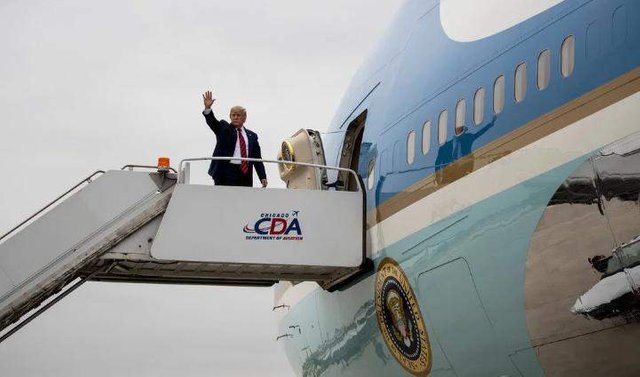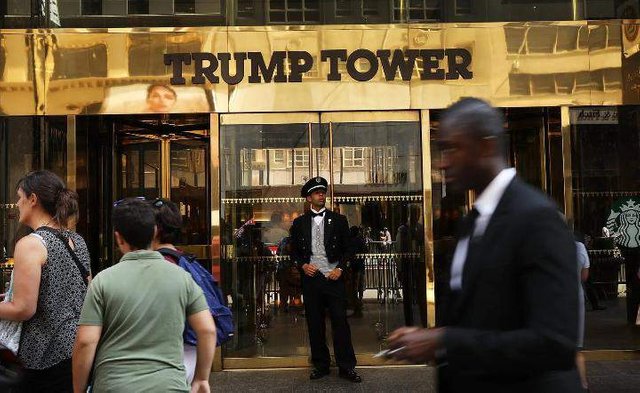Nobody Waved Goodbye: Trump’s Relationship With New York Was Already Over
The chorus of Bronx cheers from New York officials at the news that President Trump changed his primary residence to Florida was confirmation of what friends and advisers have said for months: Resuming his former life in Manhattan would be impossible.
But Mr. Trump’s decision to shift his home base to his resort in Palm Beach, which a person close to the president said was primarily to escape New York taxes, also comes at a time when the president has been disengaged from daily operations at the Trump Organization, which he once ran from Trump Tower on Fifth Avenue.
Mr. Trump turne

d over the family real estate company to his sons after his election and company executives say they doubt he will have a day-to-day management role in the business when he leaves the White House.
Since his inauguration, the Trump Organization, as the family company is known, has become more of a real estate management firm instead of a fast-growing real estate development company. Revenue at the company declined modestly in 2018, his most recent financial disclosures show.
The insults were reminders that three years into his presidency, the New York City that Mr. Trump once considered synonymous with himself no longer exists. As the son of a wealthy real estate developer who inherited many of his father’s political connections, and who sought to become a celebrity and power broker in his own right, Mr. Trump viewed the city as his playground for nearly four decades. He went to parties, squired beautiful women and avoided a boring life at all costs.
The tabloid gossip pages saw him as a valuable commodity who dangled morsels of news about himself. New York welcomed his help rebuilding a long-troubled ice skating rink in Central Park. Paparazzi followed him from one social event to another. He appeared as himself in television shows and movies.
Although he was always an outsider to Manhattan’s financial and social elite, he earned a measure of good will for donating to local politicians and supporting Democratic issues, including at various points gun control and abortion rights. But his slash-and-burn presidential campaign erased even that.
On Election Day in 2016, Mr. Trump arrived at his polling place to jeers and laughter, caught on a video recording by someone who posted it online. “You’re going to lose!” one man could be heard taunting Mr. Trump.
Three years in the White House have only made his relationship with his lifelong home worse. Mr. Trump’s name has been taken off residential buildings around Manhattan after protests from residents. Even the Central Park skating rinks that he revived — there are two — have largely been stripped of the word “Trump.”
Federal prosecutors in Manhattan brought a case against the president’s former personal lawyer Michael D. Cohen, who is now serving in prison. The district attorney in Manhattan, Cyrus Vance Jr., has issued subpoenas to obtain Mr. Trump’s tax returns, which the president has refused to make public.
A person close to Mr. Trump noted on Friday that Mr. Trump was only in New York City for a handful of days last year, including the United Nations General Assembly, and a few fund-raising events.
It was not a surprise that Mr. Trump’s series of Twitter posts on Thursday night announcing his “change in domicile” were raw with anger.
“I cherish New York, and the people of New York, and always will, but unfortunately, despite the fact that I pay millions of dollars in city, state and local taxes each year, I have been treated very badly by the political leaders of both the city and state,” he wrote. “Few have been treated worse.”
Advisers to Mr. Trump said that he had been infuriated by Mr. Vance's subpoena, part of an investigation into money Mr. Cohen paid to buy the silence of Stormy Daniels, a pornographic film actress who said she had an affair with Mr. Trump. The president is also angry about an investigation by the New York attorney general of four major Trump Organization projects.
In addition, protests and social rejection seemed an inevitable aspect of Mr. Trump’s postpresidency if he returned full time to New York.
He has told aides that he feels bad about the traffic blockades that the Secret Service requires for his travel disrupting the businesses near Trump Tower, and that he has found it less troublesome to spend time at his private golf club in Bedminster, N.J
Aides say that he misses his former life, and that being cosseted in the White House has been suffocating for him. But he will have an easier time at his club in Palm Beach, Mar-a-Lago, where he likes to play host and greeter to guests and members.
Some of his advisers see a political upside to his new affiliation. Mr. Trump’s 2020 campaign manager, Brad Parscale, said months ago that a Florida residency could be helpful to the president in a state that is a must-win in 2020, according to two people familiar with the discussions.
Even as the president has made an official break with New York, in a quirk of scheduling he is to make a trip to the city this weekend.

The main event on Mr. Trump’s schedule is attending an Ultimate Fighting Championship at Madison Garden, including a welterweight fight between Nate Diaz and Jorge Masvidal.
That event is characteristic of the degree to which Mr. Trump is from New York but no longer of it. He will be ensconced at the arena watching a fight on the same weekend that thousands of mostly upscale runners take part in one of the city’s elite events, the New York City Marathon.
At a news conference Thursday, Mr. Masvidal said “money that he’s made, the obstacles that he’s conquered” made Mr. Trump admirable, “no matter what your political views are.”
Mr. Masvidal, who grew up in Miami, acknowledged that his support of the president could anger many of his fans. “I don’t want to get too much into politics, though, you know,” he said. “A lot of my Latin community might get upset at me.”

Posted using Partiko Android